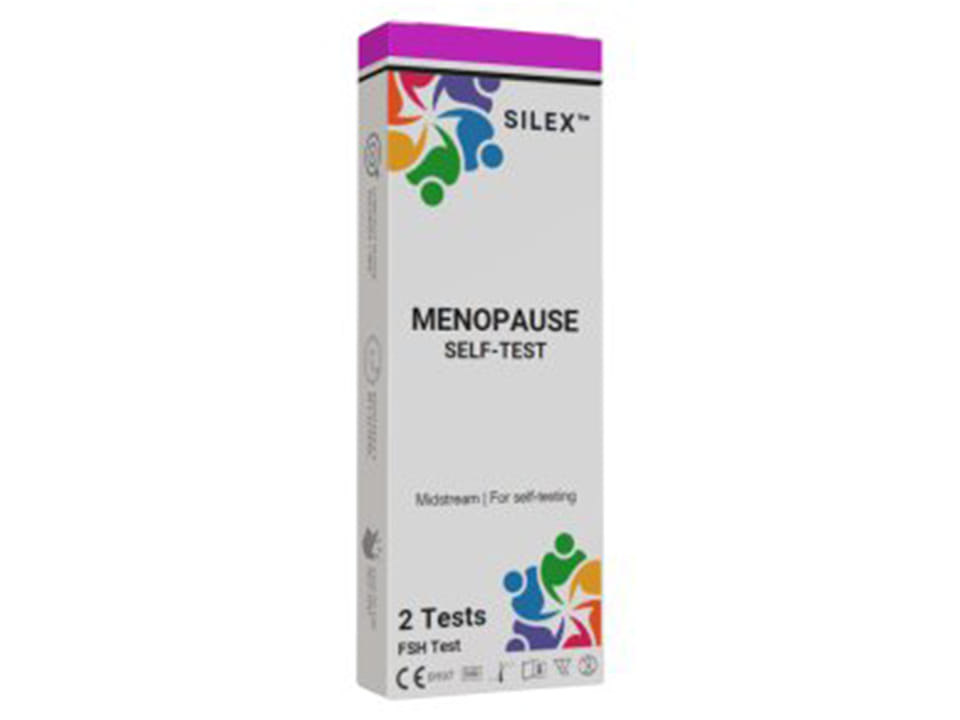We are unable to determine if you are menopausal
The menopause test results indicate that we are unable to determine if you are going through menopause or not, because you are using a hormonal contraceptive. Taking hormonal contraceptives can mask signs of approaching menopause. A urine test may provide a conclusive result. We would be happy to provide more information about menopause and symptoms associated with it. Remember, menopause is inevitable, but suffering is not!
Predict the onset of perimenopause yourself
Many women between the ages of 40 and 50 wonder if the symptoms they are experiencing are a sign of menopause. A urine self-test (which you can do from home in one simple step) can give an answer, even if certain types of hormonal contraception are used. Good to know: a urine test does not work if you are taking a combined oestrogen-progestin contraceptive pill. If you are taking a progestin-only pill, it may provide a conclusive result.
Menopause: what is happening in your body?
The transition from menstruation to menopause, also called perimenopause or the menopausal transition, is marked by a period in which your ovaries gradually produce less of the female sex hormones oestrogen and progesterone. While every woman's experience is different, there are basically three stages of menopause, each stage with associated menopausal symptoms. All women's bodies undergo changes during these stages.
Meet our doctors and specialists
Experienced doctors and specialists help you navigate the menopausal transition safely and responsibly. With their expertise and knowledge, they know exactly what women need to take charge of their health and manage challenges – or when they are suffering needlessly. You have more options that you might think. Meet our expert team.




How do contraceptive pills affect (the symptoms of) menopause?
If you are experiencing a regular monthly period, there's a very good chance that you are fertile. Therefore, many women, including perimenopausal women, use contraceptives to prevent getting pregnant. However, using birth control after age 50 can raise your risk for certain health problems. It’s important to be aware of this. A doctor explains these risks in our blog on the use of contraceptives during menopause.

What can I do?
What helps you transition through menopause more smoothly depends on your situation. Every body is different, so there is no one-size-fits-all solution. But one thing is certain: you have a lot more control over your menopausal health than you might think. Discover what you can do to reduce or prevent your symptoms, from lifestyle changes to medical solutions.
Solutions

Diet & lifestyle
Maintaining a healthy diet and lifestyle is essential to keep your body healthy and your hormones balanced.

Supplements
High-quality supplements can support your health and reduce symptoms.

Treatments
In case of moderate to severe symptoms, medication such as hormone therapy may be effective and contribute to a healthier lifestyle.
Sign up for the free guide
In the free menopause guide, menopause expert Suzanne Rouhard gives you tips and tricks to alleviate the most common symptoms. Sign up for the free menopause guide and you will also receive SeeMe nopause emails with the latest findings, tips and advice, information on treatment options and honest testimonials from other women.
Based on your answers, we will keep you up to date with relevant information on the topic of menopause. Of course, you can unsubscribe at any time.Who is SeeMe-nopause?
SeeMe-nopause is an initiative of a group of women. Women who are convinced that there are alternative ways to deal with the menopausal transition. Physical and emotional discomfort does not have to be a normal part of a woman's journey. We believe that every woman can navigate their menopausal journey empowered and with vitality. We can help you regain control.
Working with a team of doctors and menopause specialists, SeeMe-nopause provides you with science-backed information, tips, advice and premium nutritional supplements to support your health during this stage of your life. We are your online specialist offering menopause care in the comfort of your home.


FAQ
Who is SeeMe-nopause?
SeeMe-nopause was founded on the initiative of a group of women and is part of the eHealth Ventures Group, a leading organisation specialising in digital health solutions with platforms in 14 countries.
With a team of doctors and menopause specialists, we provide access to information and supplements. We will also offer medicinal products and therapies in the near future. Our goal is to give women the tools they need to not only survive but thrive through perimenopause and beyond. More about us.
What can SeeMe-nopause do for me?
We can help alleviate menopausal symptoms by helping you make minor adjustments to your life and by providing expert support. We make specialist knowledge, scientific advice and medical support accessible. Discover how you can feel more energised, relaxed and balanced by, for example, eating healthier and exercising. There are also supplements to support your health as you go through the menopausal transition. In the meantime, we are working hard to make medical treatments, including hormone therapy, accessible through our platform.
How can I order products or treatments?
SeeMe-nopause forms the link between you, the doctor and the pharmacy. On our platform, with the help of our Decision Aid, you can explore which dietary supplements or (medicinal) products can support you on your journey into menopause and beyond. Some products require a doctor's prescription. This is why you need to complete an extensive medical questionnaire with your order request. A doctor will review your questionnaire and determine if the desired medication is right for you. If so, the doctor will forward your order to the pharmacy. If not, another medicine that suits your needs better may be recommended.
Your path to a smooth menopause starts here
Get the tools you need to navigate menopause with more ease and to educate yourself about your body. With tips and insights from experts, and relatable stories of women just like you. Press play, not pause.









